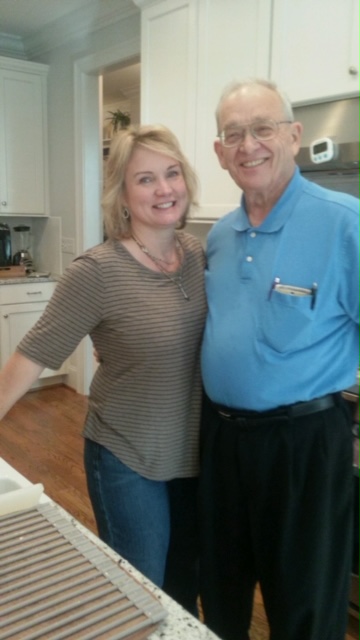By Kathy Montero
 PART ONE:
PART ONE:
Several years ago, when our youngest child was only 3, my husband and I found ourselves suddenly responsible for caring for all four of our aging parents within a 6-month period. Each of us had a parent with ‘yet to be diagnosed’ Alzheimer’s Disease and when the other parental half suffered a serious illness, things unraveled quickly. Since 2012, our family has undergone a significant metamorphosis – my husband moved to a less demanding job because our family’s needs took precedence over his career; I left the workforce temporarily to be a full-time caregiver; we built a handicap accessible, dementia friendly home to enable us to better care for them while learning about cancer, stroke recovery, Alzheimer’s Disease and all things related. We’ve experienced the full spectrum of adverse emotions: denial, grief, guilt, anger, resentment, fear, frustration, anxiety, fatigue and more guilt – the hallmark emotions most caregivers report.
Ten years later and still smack in the middle of the sandwich generation, – raising our own children and caring for aging parents, I am amazed by how far we have come. I am happy to report that I now possess more self-awareness, gratitude and joy than I did before becoming a caregiver. It certainly hasn’t always been that way, and some days are still an emotionally draining challenge. Our lives aren’t necessarily any less complicated or easier now, but my attitude and perspective make them more bearable, some days even enjoyable. When I ruminate on what has made the biggest difference in my mental outlook, I can identify 3 lessons I’ve learned along the way:
- Caregiving is a Marathon, not a Sprint
- Create a Village of Support and
- Find Joy through Humor
I only wished I’d realized and accepted their significance sooner. In this 3-part series, I will share each of these lessons and how they can influence your perspective. Unfortunately, there is no magic cure for the stress involved with caregiving, but gratefully, there are steps you can take to improve your quality of life and even bring a surprising sense of joy into it.
 Caregiving is a Marathon, not a Sprint
Caregiving is a Marathon, not a Sprint
I suspect most people begin the caregiving journey without even realizing it. Some event sets in motion a series of changes, much like dominos tumbling. A loved one falls, becomes ill, or has a close call requiring some type of intervention or assistance. Initially, you believe that once you fix this, everything will return to normal. Perhaps it does, if only briefly, until the next crises emerge. Because so many of us are project or task oriented, it is easy to look at each incident as an isolated occurrence needing to be addressed. These events often signal the beginning of a new journey together. Accept that you are not just racing past each hurdle hoping to return to baseline, but rather pacing yourself for a lengthy trek that might shift the pace for everyone.
Pacing yourself can be one of the most difficult aspects to manage initially. Odds are, you had a relatively full life before you found yourself in this new caregiving role. Perhaps you have a job, children, a home to maintain, volunteer work, hobbies, etc. In the beginning, you may have been able to add in additional responsibilities with some shifting, anticipating they would be short-lived. But eventually, you may come to realize you are overwhelmed much of the time. If not before, it is at this point where it might be helpful to take a step back and look at the big picture. I have found that although it can be initially unsettling, having a realistic outlook and expectations can often provide some sense of control in a situation where we often feel out of control. Depending on your loved-one’s diagnosis, is the situation likely to improve or continue to require additional support and care. What are your priorities? What things can be paused or delegated to make space for caregiving responsibilities?
When on an airplane, they always tell you that in an emergency, to put your oxygen mask on before assisting others. The same is true when you are on the ground and balancing caregiving with all your previous responsibilities. Initially, it may seem easier to skip those things that don’t seem necessary, exercise, time alone, time with friends, etc but the truth is, you need time for you now more than ever. Balancing your needs with your loved one’s needs is crucial to long term success. Like it or not, you are now running a marathon, requiring daily commitment to spend at least a few minutes training, or in this case, identifying what recharges you. In addition, ensure you have something to look forward to everyday. Maybe it’s taking a walk, reading a few minutes before falling asleep, a relaxing bath or a dinner out with friends. Make regular time to nourish your soul, whatever that means to you.
The second part of this series, “Creating a Village” will help you identify strategies and resources to help keep you recharged. In the meantime, as much as there is to do, taking care of you is equally important. And remember while scheduling and transporting loved ones to their medical appointments, to schedule and KEEP your healthcare appointments as well.
Feature Photo by RUN 4 FFWPU from Pexels


